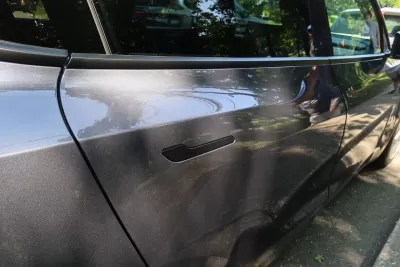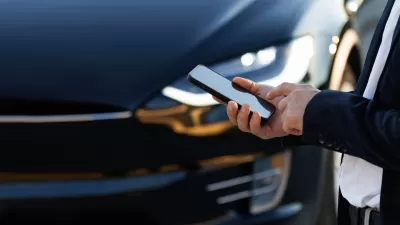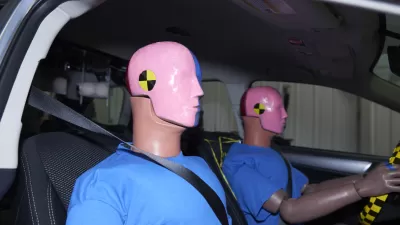The shift to electronic controls can have deadly consequences for drivers and passengers.

A recent crash that killed four people in a Tesla illustrates the importance of keeping mechanical handles on vehicles, writes Jesus Diaz in Fast Company.
“As Tesla details on its website, the Model Y features electronic door latches that require pressing a button to open via an electric mechanism. The car also has a mechanical emergency open system that many say would be nearly impossible to operate in an actual emergency.” The people involved in the latest crash were trapped inside the car, unable to open the doors — and neither were passersby who tried to help.
I get it, opening a door by clicking a button may seem cool—until it kills you. But the fact is that these buttons, just like the touch interfaces that control many car functions nowadays, are dangerous.
According to Diaz, all Tesla models have complicated emergency release mechanisms that require removing a panel or reaching under a seat. “Most people traveling in these cars are clueless about these mechanisms,” Diaz adds.
To address the issue, the European New Car Assessment Program (Euro NCAP) has announced that “starting in 2026, vehicles that delegate essential functions to touchscreens and fail to meet minimum physical control requirements will not qualify for the highest safety certifications.”
FULL STORY: Tesla’s latest fatal fire is a reminder of why cars need old-school door handles

Planetizen Federal Action Tracker
A weekly monitor of how Trump’s orders and actions are impacting planners and planning in America.

Maui's Vacation Rental Debate Turns Ugly
Verbal attacks, misinformation campaigns and fistfights plague a high-stakes debate to convert thousands of vacation rentals into long-term housing.

Cuomo Is the Candidate of Both NIMBYs and Developers. What Gives?
In the New York City mayoral race, odd bedfellows align to preserve the housing status quo.

San Antonio and Austin are Fusing Into one Massive Megaregion
The region spanning the two central Texas cities is growing fast, posing challenges for local infrastructure and water supplies.

Charlottesville Temporarily Has No Zoning Code
A judge ordered the Virginia city to throw out its newly revised zoning code, leaving permitting for new development in legal limbo.

In California Battle of Housing vs. Environment, Housing Just Won
A new state law significantly limits the power of CEQA, an environmental review law that served as a powerful tool for blocking new development.
Urban Design for Planners 1: Software Tools
This six-course series explores essential urban design concepts using open source software and equips planners with the tools they need to participate fully in the urban design process.
Planning for Universal Design
Learn the tools for implementing Universal Design in planning regulations.
Heyer Gruel & Associates PA
JM Goldson LLC
Custer County Colorado
City of Camden Redevelopment Agency
City of Astoria
Transportation Research & Education Center (TREC) at Portland State University
Jefferson Parish Government
Camden Redevelopment Agency
City of Claremont





























